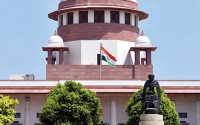$100 Website Offer
Get your personal website + domain for just $100.
Limited Time Offer!
Claim Your Website NowKarnataka HC upholds Senior Designations of 18 Advocates.
Source:- barandbench.com
The Karnataka High Court recently dismissed petitions challenging the designation of 18 lawyers as Senior Advocates in November 2018.
A Division Bench of Chief JusticeAbhay Shreeniwas Oka and Justice Mohammad Nawaz also looked into the constitutionality of the High Court of Karnataka (Designation of Senior Advocates), Rules, 2018 (Senior Designation Rules) which were issued pursuant to the Supreme Court’s judgment of Indira Jaising v. Supreme Court of India. In this regard, the Court held,
“If any of the Rules…framed by the High Court of Karnataka is either inconsistent or contrary to the directions issued by the Apex Court in the case of Indira Jaising (supra), either the same will have to be read down or will have to be ignored and the process of designation of the Advocates as Senior Advocates must be commenced and carried out strictly in terms of the directions of the Apex Court.”
In this regard, Rule 11, which gives finality to the views of the Chief Justice, was held to be contrary to the decision of the Supreme Court.
It was also held that the scope of judicial review of decisions of the Full Court in the designation process was limited.
“When a writ Court is called upon to exercise its power of judicial review under Article-226 of the Constitution of India against the decision of the Full Court, it cannot go into the merits of the decision and it can examine only the decision making process.”
The petition was filed by four lawyers – Puthige R Ramesh, MH Sawkar, Ganesh Krishna Bhat, and BL Acharya – on the ground that the designations were made in an arbitrary and irrational manner. Another petition was filed by Advocate TN Raghupathy.
Among the issues raised were that several provisions of the Senior Designation Rules framed by the High Court have been violated in the recently conducted designation process, that the process was concluded in a hasty manner after two judges of the High Court were recommended for transfer by the Supreme Collegium, and that the Rules do not contemplate for cut-off marks for the applicants, as was done in this case.
Allegations that less deserving lawyers had been designated as Senior Advocates and apprehension of bias on the part of then Advocate General Udaya Holla, part of the Permanent Committee for designations, were also raised.
After considering all arguments, the Court held that there was no reason to interfere in the designations made in November 2018.
However, the Court took a dim view that one of the designees, Lakshmy Iyengar, made certain allegations against Senior Advocate BV Acharya, who is the father of one of the petitioners.
The petitioners had claimed that Iyengar, who secured the maximum marks in the designation process, has only eight reported judgments to her name, as opposed to other more experienced lawyers.
On her part, Iyengar claimed that Acharya was involved in unethical propaganda against her by making phone calls to several Senior Advocates. She also alleged that the senior lawyer spread the rumour that she had granted sexual favours to ensure her designation.
The Court, however, noted that absolutely no attempt was made to substantiate the said allegations. In this light, the Court recommended that her designation be reviewed by the Full Court.
“More so when after giving an opportunity to withdraw the allegations against the Senior Advocate, the same were not withdrawn by her. Therefore, we are of the view that her case needs to be considered by the Full Court for review or recall in accordance with the directions of the Apex Court contained in paragraph 73.11 in the case of Indira Jaising (supra).”
Karnataka High Court
Further, the Court upheld the point-based system and held that the cases of all candidates were duly considered by the Full Court. The Court also dismissed concerns regarding the transfer of Justice Raghvendra Chauhan, who was then part of the Full Court that signed off on the designations.
The Bench also held that the Full Court is not bound by the overall assessment or points/marks assigned by the Permanent Committee. The Full Court is not bound to record reasons for not accepting the dissent expressed by few members, the Court further held.



